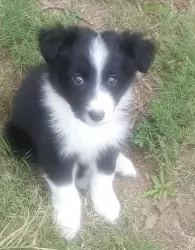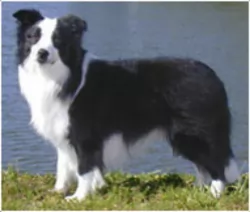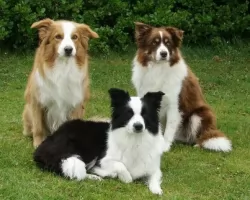 MyDogBreeds
MyDogBreedsMixed is originated from United States but Border Collie is originated from United Kingdom. Mixed may grow 54 cm / 22 inches higher than Border Collie. Mixed may weigh 92 kg / 203 pounds more than Border Collie. Mixed may live 3 years more than Border Collie. Mixed may have more litter size than Border Collie. Both Mixed and Border Collie requires Moderate maintenance.
Many people are inclined to think that mixed breed or cross-breed dogs, also known as mutts or mongrels or designer dogs are just pavement specials. They think they look nothing much better than junkyard mutts.
This may be so, but not always, and these mixed breed dogs always seem to have hearts of gold. A Mixed breed is a dog that has parent’s who aren’t registered and who come from different breeds. In other words the parents aren’t of the same breed.
Guessing a cross breed’s ancestry can be difficult as these mixed-breeds have more genetic variation than pure breeds. They've been around since ancient times. The dogs originate in different countries and they all have different coats, different sizes and different temperaments.
It is sad but true – there are literally millions of mixed dogs worldwide, some of which never know what it is to live with- and be lovingly cared for by a human being.
 The Border Collie originated in Northumberland and was used to herd livestock. He is particularly well known for his intense stare in controlling the sheep in his care. The name Border Collier wasn’t used until 1915. This was so that the dog could be registered as a separate breed together with other Collie breeds already registered.
The Border Collie originated in Northumberland and was used to herd livestock. He is particularly well known for his intense stare in controlling the sheep in his care. The name Border Collier wasn’t used until 1915. This was so that the dog could be registered as a separate breed together with other Collie breeds already registered.
Sheepdog trials have been held since 1873. The very name of this dog gives you an inkling as to his heritage, as the word ‘Collie’ refers to sheepdogs and comes from Scottish dialect. Today the Border Collie is recognized as the ultimate sheep-herding dog, with his amazing intelligence and herding skills. The Border Collie was recognized by the American Kennel Club in October 1995.
Sometimes Mixed dog breeds come about from two dogs meeting on the streets and mating or it could be two pure-breeds accidentally mating, resulting in a mixed breed.
The mixed breed dog puppy could inherit looks from just the one purebred parent so that he grows up looking like a pure-breed. With a cross breed the standard for breeding isn’t the same for purebreds where the appearance and temperament is more or less the same.
A mixed breed dog doesn’t have these standards to conform to and they are as varied and unique as the colors in the rainbow. It’s not possible to know what a mixed breed dog’s puppies will look like. A typical example of a mixed breed is a Labradoodle. People love the temperament of the Labrador but they want the low shedding qualities of the Poodle as well.
Mixed breed dogs can be small or large and that means different litter sizes. If you don’t want your Mixed dog breed becoming a parent, you can spay or neuter your dog.
There are many people who avoid choosing a ridiculously high priced pure breed puppy and they prefer to choose a mixed breed. This is partly because these mixed breed dogs are healthy, resilient and nearly always a good match for you and your family.
 Utterly responsive, intelligent, alert and keen, the medium sized border collie loves nothing more than to be actively working. He requires both mental and physical stimulation. The ideal height for this very intelligent dog is 46 – 53cm and they weigh in at about 14 – 22kg.
Utterly responsive, intelligent, alert and keen, the medium sized border collie loves nothing more than to be actively working. He requires both mental and physical stimulation. The ideal height for this very intelligent dog is 46 – 53cm and they weigh in at about 14 – 22kg.
People who have been to sheepdog trials can only marvel a this dog and his intense stare, moving the sheep to precisely where his master wants them. The dog has a moderately long and smooth coat with a dense topcoat, with soft weather resistant undercoat. Most common color is black and white but other colors such as chocolate and white, liver and white or blue merle are also seen.
There are a few Border Collies which have a single-colour coat. He has a long feathery tail and the ears can be either erect, semi-erect and in some instances, even dropped. He has brown eyes but sometimes with the Merle Border Collie you can get one eye or part of the eye which is blue.
Border Collies are playful, energetic dogs who just love living in homes where the family involves him in all their activities. Because he is so intelligent, he is demanding of his human family, wanting them to take notice of him and provide him with lots of clever games and sports. If he is left without involvement, he can become frustrated and destructive. That is why it is so important to choose your pet carefully.
These highly energetic dogs require owners who recognize this need and are prepared to provide him with lots of games, walks and runs.
Doesn’t matter what your Mixed breed dog looks like – he is a unique individual and you can never really predict what kind of a character he will turn out to be.
He might inherit a bit of placid behavior from one parent and a bit of clownish behavior from the other. It’s what makes them so special.
Ask most dog lovers who have owned a mixed breed and you will usually hear them say that they wouldn’t trade their amazing loyal and devoted pet for all the money in the world.
 The Border Collie is such an awesome working dog breed, being of tremendous help to farmers. With their endless energy and stamina, given the chance he would want to be working all day. This medium sized dog will need a family where they are hard working and active just like him. He makes a wonderful pet with the right owners and if everyone is active in the family, he becomes your devoted soulmate.
The Border Collie is such an awesome working dog breed, being of tremendous help to farmers. With their endless energy and stamina, given the chance he would want to be working all day. This medium sized dog will need a family where they are hard working and active just like him. He makes a wonderful pet with the right owners and if everyone is active in the family, he becomes your devoted soulmate.
He is sensitive to what his owner wants and that is also because he is highly intelligent. Shower your wonderful pet with lots of love, give him lots of attention and plenty of activities, and you’ll have an awesome friend for life.
All dogs, whether pure breeds or mixed breeds, need to be excellently cared for. When you consider the unconditional love your dog gives you, you want to ensure that you’re kind and loving towards him.
Every dog can be prone to common dog illnesses and there are some genetic predispositions for dogs with certain breeds within them.
All dogs can battle with problem teeth, but it appears to be more rife with smaller dogs. Dental disease starts with tartar build-up and when it isn’t removed from the teeth it progresses towards infection of the gums and teeth.
What you need to know is that not caring for the teeth can mean your pet losing his teeth but also putting your dog in danger of joint disease and problems with the kidneys and heart.
Obesity is a huge factor in small- and large dogs and can pave the way for other diseases with your pet. Being obese can shorten the life of your pet because it contributes to heart disease, digestive disorders, back pain and joint problems.
Fleas, ticks, mites and worms can play havoc with the health of your pet. Some of these parasites can then be transmitted from your pet to you. Parasites can cause pain, weight loss and even death for your pet so it is important to be vigilant in these matters.
Bloat, when the stomach twists and fills with gas as well as cancer and heart disease are just some of the more common diseases to look out for.
 If your Border Collie is healthy, he can live to be 14 years of age and longer. There are one or two dog ailments that are more common in this breed, so it is wise to be aware of what can go wrong, although with good care it is highly unlikely.
If your Border Collie is healthy, he can live to be 14 years of age and longer. There are one or two dog ailments that are more common in this breed, so it is wise to be aware of what can go wrong, although with good care it is highly unlikely.
Primary epilepsy, known as idiopathic epilepsy can be seen in your dog before the age of 5 years, and although a genetic link in border collies has not yet been identified, idiopathic epilepsy is more prevalent in some breeds. Seizures in your dog are caused by electrical disturbances in the brain and treatment may be for life. While epilepsy in dogs can’t be cured, the condition can be managed with medication recommended by your vet and then he can lead a healthy life.
Collies are prone to developing hip dysplasia, which is an inherited condition with abnormal formation of the hip socket. For your pet it can mean lameness as well as painful arthritis. You’ll see your collie dog battling to rise after lying down. It is actually common in lots of dog breeds, but more so in larger breeds.
This is an inherited problem that can lead to your dog going blind. About 70 to 97% of collies in the UK and the United States are affected. Your veterinarian will examine your dog to determine the extent of the defect. It is common in the first year of a dog and can be be prevented if caught early.
Good nutritious food, exercise, grooming, a dry place to sleep, taking your pet to the vet when he is sick as well as plenty of love and attention will ensure your Mixed dog breed’s health and happiness.
Keep die diet of your pet simple and consistent to avoid digestive problems. Quality commercially manufactured food is a good choice. Boiled chicken, brown rice and cooked or raw vegetables will be excellent added into your dog’s kibble from time to time. Add in some raw meat occasionally as it is good for warding off skin diseases.
Exercise your pet regularly, but don’t overdo it with young dogs as it can lead to joint problems later on in life.
 This is a dog that will need plenty of exercise and attention. He won’t do well cooped up in a tiny home. He’ll want lots of place to run and play and with his owners involved in his activities. It is unfair of any dog owner to buy a dog like this and then leave him so that he becomes distressed from being ignored.
This is a dog that will need plenty of exercise and attention. He won’t do well cooped up in a tiny home. He’ll want lots of place to run and play and with his owners involved in his activities. It is unfair of any dog owner to buy a dog like this and then leave him so that he becomes distressed from being ignored.
Do your dog a favor and see that he is socialized as a puppy and trained as he grows older. Once he has been trained, he becomes a super pet, obedient, sensitive and willing to please.
Border collies shed throughout the year, and with Summer his shedding becomes a bit more. He will require a good brushing at least twice a week to get rid of loose hairs and to ensure that the long hair doesn’t become tangled. He isn’t considered hypoallergenic and is regarded as a safe pet to have for people with allergies.
This high energy working dog will require top quality food from the top brands if you intend feeding him from commercially produced dog food. He will certainly need raw meat added to this food from time to time to ensure you stave off skin problems such as rashes. You can also add in rice, meat and vegetables for variety to ensure his is getting in all the minerals and vitamins he needs. Fresh, cool water should always be available to him day and night.